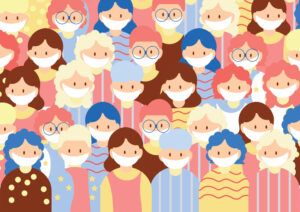Opinion
Vaccine Musings #2


Second of two connected articles (first is here)


By Dr. Betsy Stone
What do we do with all this grief and loss? How do we begin to manage the trauma of 2020 as we careen, or limp, into 2021? What do we feel as we realize that 2021 won’t make us feel all that much better?
There is an axiom in psychology that simply tells us to speak of our grief. Grief spoken is grief diminished. It doesn’t make it go away, but shared grief is validated and normalized. The first behavior we need to encourage in ourselves and in others is to speak of this year and how we feel. Are you exhausted? Say so. Are you sad? Say so. Are you lonely? Say so. Find people who are willing to listen and share. And then let them share in return. Our kids need to hear us express our sadness, as models that their sadness is normal and acceptable. Draw your sadness or sing your sadness or talk about your sadness or run your sadness, but remember to acknowledge your sadness.
We also need to find ways to express our communal grief. Do you organize a community shiva when you can come together? Create one that permits and encourages condolences for both those who have had personal losses and those who have not. Do you give everyone a torn ribbon? Do they get a needle and thread to sew it back up, creating a scar? Do we all sit on low stools?
We know that most people expect grief to be “processed” in six weeks. At that point, we start asking mourners if they’re feeling better. Our social norms do not permit extended grief to be public, which sends mourners underground, thinking they’re wrong to be in pain. In light of the year we’re still enduring, we need to focus on the lessons we can impart. How can we help each other navigate this new world?
Teach people that this is a life-long pain, that recovery involves owning the hurt as an integral part of our lives.
Use Jewish rituals and holidays as opportunities to process COVID and the challenges of this year. At Purim, instead of dressing like Vashti or Mordechai, we might dress as the lessons we’ve learned this year or symbols of the time. We could “show up” as sourdough or as a vaccine – or as an election machine, a protest or a front line worker. Or create a contest for the best Zoom screen? Let’s put our calendar to work for us.
Pesach is rife with processing opportunities. What does freedom mean if we experience ourselves as enslaved? What did we need to unlearn in the midbar to get to the promised land? We might add questions to our seders, including, for example, what were the COVID keepers? What did you learn you want to hold on to? Whether it’s the way you spend your time or the dishes you’ve learned to cook, identify the parts of COVID that are actually blessings.
At the simplest level, let’s create spaces for shared emotions. Put large pieces of paper up on your walls and encourage people to write or draw their feelings – and leave them up for a long time. Our feelings will change and grow. Simply creating a space for emotional expression implies that emotional expression is normal. Leaving it up teaches us to keep processing. Create healing services with long periods of wordless music and silence. Leave your sanctuary open and encourage people to sit alone with their thoughts. Bench gomel together. Give people opportunities to feel.
And not just the losses. We also need communal times of joy. Let’s celebrate the births of COVID, the marriages of COVID, the graduations and new jobs and new loves.
Be creative, if you can. Creativity can be hard to come by in times of trauma, but try new things. New ways of reaching out. As Ms. Frizzle says, “Take chances, make mistakes!” And when something works, share it. Understand that what worked before may not work now, and that what works now may not work later. Be willing to adapt.
For children, remember that what you teach has to take second place to where they are. Don’t rush to “catch up.” It’s less important that each child know content. What matters is that they – and we – experience Jewish places as places of safety and growth. Connect, make space for feelings, fears and joys.
For our teens, there are huge Jewish questions that COVID has raised. Engage them in discussions about God, about tikkun olam. Don’t tell them what Judaism says. Help them find what they believe. They may need permission to be angry, sad, scared, elated. Make your space a space that has room for their questions. Hold your answers. Adolescence is a time for personal exploration. When we answer questions, we cut off their knowledge seeking.
The people who return to our spaces will not be the people who left those spaces. We are not those people any longer. Let’s begin to think about sanctifying ourselves anew. Like the myth of the Chanukah oil, let’s find the miracles in rebuilding, person by person, stone by stone.
Betsy S. Stone, Ph.D., is a retired psychologist who currently teaches as an adjunct lecturer at HUC-JIR. Her classes include Human Development for Educators, The Spiritual Life-Cycle, Adolescent Development and Teens In and Out of Crisis. She is a regular contributor to eJewish Philanthropy.












